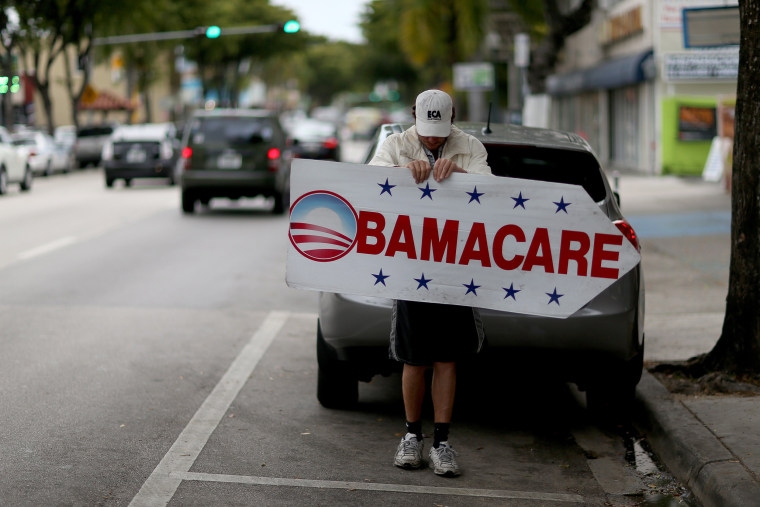WASHINGTON — The Senate is taking baby steps toward a health care bill amid serious disagreement among lawmakers. But the health care industry waits for no one, and insurers are growing increasingly rattled by a combination of inaction in Congress and outright threats of sabotage from the White House.
Customers could soon be paying the price.
Insurance companies, which are reaching deadlines to submit premiums for the individual health care market and to decide whether to sell policies at all, say the uncertainty is driving their premiums higher and their participation lower. These complaints come on top of existing problems in Obamacare markets that would have demanded attention if Democrats had won.
Regardless of what lawmakers do in the long run, the time may have already passed for Congress to rescue the 2018 insurance market from the negative effects of the current debate. Insurers are putting in their initial bids for premiums and will finalize their plans in September. That means even a temporary fix would likely fail to shield customers from the effects of uncertainty.
"We needed to have the answers three months ago," Bob Laszewski, president of Health Policy and Strategy Associates, a consulting firm in Washington, D.C., told NBC News.
With the market rapidly reaching a point of no return, the political fight in Washington could shift from the future of health care to which party is to blame for its present.
The costs of uncertainty
Last week, Blue Cross and Blue Shield of North Carolina announced that it would seek a 22.9 percent increase in premiums for 2018 plans. But it pointedly added that the hike would be just 8.8 percent if Congress and the Trump administration guaranteed subsidies that they're owed for paying out-of-pocket costs for low-income customers.
The company also reserved the right to withdraw entirely because of the "undecided future" of the Affordable Care Act, popularly known as Obamacare.
In other states, insurers are already pulling out of the market. When Blue Cross and Blue Shield of Kansas City withdrew, it left 25 counties without an insurer and many others with only one. In announcing the move, the company cited major losses of more than $100 million but also the "uncertain direction" of the market.
President Donald Trump has repeatedly hinted that he might cut off the cost-sharing payments, which are the subject of a House Republican lawsuit against the Obama administration, as a way to put political pressure on Democrats.
America's Health Insurance Plans, or AHIP, the nation's leading insurance lobby, has demanded that the White House and Congress resolve the subsidies immediately — or take the blame for hurting consumers.
"This uncertainty is arguably the single most destabilizing factor in the individual market, and millions of Americans could soon feel the impact of fewer choices, higher costs, and reduced access to care," Cathryn Donaldson, a spokeswoman for AHIP, said in an email.
Sen. Susan Collins, R-Maine, has urged lawmakers to address the issue.
"Those subsidies are not only important to stabilize the insurance markets, but they're absolutely vital to low-income individuals," she told NBC News.
But others see any fallout as the Democrats' fault for drafting their bill improperly, which is the basis of the lawsuit: Sen. John Barrasso, R-Wyoming, blamed former President Barack Obama for "making illegal payments" when asked about the recent insurer news.
The situation is growing turbulent enough that Sen. Ron Johnson, R-Wisconsin, told NBC News that he could support separate legislation to shore up markets while Congress works on a full Obamacare replacement.
"If we have to break this and do something short term to stabilize the markets, I would support that," Johnson said.
But Johnson added that his take "may be a minority view" within the Republican Party, which is uneasy with any move perceived as bolstering the Obamacare framework. Given Trump's discussion of using failing insurance markets as a political cudgel against Democrats, the president could also veto such an effort.
Blame game
Policy experts say the cost-sharing subsidies are only one of many factors upsetting the markets. Insurers are also concerned that the White House might decline to enforce the individual mandate or refuse to adequately advertise during enrollment periods, something that happened briefly after the inauguration.
Then there are the many variables in Congress: AHIP and some insurance executives criticized the House bill that passed in May, and there are few clues as to how the Senate will respond, or when, or whether it will be able to get legislation to the president's desk at all.
"Republicans haven't really done anything to signal that the non-group market will ever become a viable business proposition," said Joe Antos, a scholar at the conservative American Enterprise Institute.
Finally, there's Obamacare's own problems.
In many places, the insurance markets have attracted more sick customers and fewer healthy customers than had been hoped. Even before Trump took office, there was a rash of premium hikes averaging 25 percent nationwide this year, as well as a major decline in the number of available plans, although no counties were left with zero options.
Obamacare's subsidies made up the difference for many customers, but those whose incomes were too high to qualify have faced steep new costs.
The stew of factors muddies responsibility and has left each party rushing to tar the other with negative headlines.

"Obamacare is collapsing under its own weight, and BCBS [Blue Cross/Blue Shield] itself is leaving Kansas and Missouri as a consequence," a White House spokesman said. "The rising costs of health care predate the Trump administration."
Republicans were quick last week to bring up the North Carolina and Missouri news as evidence that Obamacare needed to be replaced.
"This plan simply hasn't worked, it isn't working, and it is going to get worse before it gets better," Sen. Roy Blunt, R-Missouri, said in a floor speech.
But Democrats were eager to bring up the news, as well. Senate Democratic leader Chuck Schumer of New York spoke on the floor warning of Republican "sabotage" and predicted that his rivals would face the wrath of voters if they tried to pawn off responsibility.
"When people get a bad health care bill, you can blame anyone you want," he said last week. "You are in charge."
Looking to seize the legislative high ground, Sen. Claire McCaskill, D-Missouri, introduced a bill that would allow people in counties that lack insurers to access the same exchange plans as members of Congress.
"I knew that the president had expressed his desire to sabotage people's insurance coverage, so I anticipated that this would happen," she said, referring to the pullout of Blue Cross and Blue Shield of Kansas City. The measure, she said, "is an immediate fix, and we ought to get an immediate vote."
The state of play
Despite Obamacare's ongoing struggles, outside analysts said the exchanges appeared to be in better shape earlier this year as insurers adjusted their prices to meet the environment.
Sabrina Corlette, a professor at the Center on Health Insurance Reforms at Georgetown University who has been tracking insurers' quarterly earnings, said companies' comments to shareholders have grown more upbeat even as they warn that uncertainty in Washington raises new risks.
"There's probably some blame on all sides, but my perspective is that while many carriers faced significant challenges in the rollout of Obamacare's marketplaces, things were starting to stabilize financially," she said.
The nonpartisan Congressional Budget Office reached somewhat similar conclusions in its evaluation of the House health care bill last week.
Buried in the report, the CBO assessed that the markets should be "stable in most areas" in the absence of any changes. But the agency added that "several factors could lead insurers to withdraw from the market — including lack of profitability and substantial uncertainty about enforcement of the individual mandate and about future payments of the cost-sharing subsidies."
There's also the question of whether the Republican plan would address the growing consumer difficulties on the insurance market. The House bill would cover 23 million fewer people while raising out-of-pocket costs for many customers and hiking premiums for older low-income Americans, according to the CBO.
Democrats, for their part, have suggested a variety of alternative fixes. headlined by a public insurance option, but there's little sign that the two parties would cooperate without a major shift in the political landscape.
"We're not going to waste our time talking to people who have no interest in fixing the problem," Senate Republican leader Mitch McConnell of Kentucky said last week.

